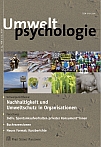Artikeldetails
 Dirk Scheffler & Andreas Lieber (2018),
Dirk Scheffler & Andreas Lieber (2018),Mehr Wert schaffen – gemeinwohlorientierte Unternehmenspraxis im Interview
Einführung, Erfolgsfaktoren und Akzeptanz wertorientierter Organisationsentwicklung am Beispiel der Gemeinwohlbilanzierung.
Umweltpsychologie 22(2), 88-118.
Dieser Artikel wurde in deutsch verfasst.
| Zusammenfassung: | Anlässlich der Notwendigkeit der Transformation der Wirtschaft zu einer nachhaltigeren, gemeinwohlorientierteren Wirtschaftsweise wurden Führungskräfte von acht Unternehmen mit überdurchschnittlich nachhaltiger Ausrichtung zu ihren Praxiserfahrungen mit der Gemeinwohlbilanz (GWB) der Gemeinwohl-Ökonomie (GWÖ) explorativ interviewt. Die Leitfragen thematisierten u.a. welchen Mehrwert die GWB bietet, das Vorgehen und Erfolgsfaktoren bei der Bilanzierung, die Beteiligung der Stakeholder und Forderungen an die Branche und Politik im Hinblick auf eine gemeinwohlorientierte Transformation der Wirtschaft. Die Interviews veranschaulichen, dass schon heute die Abkehr von der Profitmaximierung und vom Gewinn als alleinigen Erfolgsindikator zugunsten gemeinwohlorientierten Wirtschaftens praktisch möglich ist. Die Interviewten berichten trotz des hohen Aufwands der Bilanzierung und hinderlicher Rahmenbedingungen von positiven Effekten auf die Lieferketten, Mitarbeitende, Kund*innen und für die Profilierung am Markt. Die Interviewten fordern von der Politik u.a. den Abbau von Benachteiligungen für nachhaltig wirtschaftende Unternehmen und eine vorbildliche gemeinwohlorientierte Ausrichtung von staatlichen und kommunalen Organisationen. |
| Schlagworte: | Bilanz Gemeinwohl Nachhaltige Organisationsentwicklung Unternehmen Unternehmensethik |
| Abstract: | Because of the need to transform the economy into a more sustainable and more common good-oriented one, practical experiences with the Common Good Balance of the Economy for the Common Good have been investigated by means of exploratory interviews with executives from eight above-average sustainability-oriented companies. The key questions dealt with the added value the Common Good Balance offers, the procedure and success factors for establishing a Common Good Balance, the involvement of stakeholders, and the demands on the industry branches and politics regarding a transformation of the economy towards a common good orientation. The interviews illustrate that turning away from profit maximization as a sole indicator of success, in favor of a common good oriented economy, is practically already possible. The interviewees report positive effects on the supply chains, employees, customers and market position despite the high cost of common good accounting and hindering general conditions. Among other things, the executives demand from politics the reduction of disadvantages for sustainable enterprises, and an exemplary common good orientation of state and municipal organizations. |
| Keywords: | Balance Business Ethics Business Organizations Common Good Public Value Sustainable Organizational Development |
Zum Inhaltsverzeichnis

